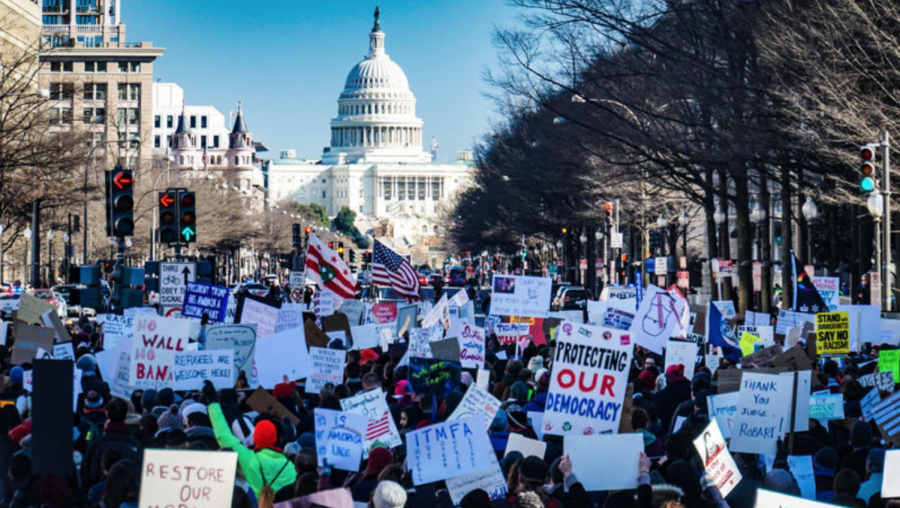The Overton Window: Menlo Freshmen React Differently to Riots Than Parents Do
Anti-Trump protesters rally outside of the Capitol in opposition to the Trump supporters who rioted at the Capitol on January 6th, 2021. Creative Commons photo: Ted Eytan on Flickr.
January 26, 2021
When I first heard that the president of the United States was egging on a domestic coup at the Capitol, I couldn’t help but chuckle. “Typical Trump,” I thought to myself. For the new year to begin with violence and chaos seemed natural, so much so that the riot at the U.S. Capitol on Jan. 6 didn’t surprise me. My amusement, however, was quickly followed by a pang of guilt. Reality settled in, and I realized that I should be treating the Capitol mob with more severity. I felt I should be more disappointed and shocked.
I wondered if my lack of emotions was a bitter reflection of my privilege, given that the confederate flag waving through the halls of the Capitol had no conflict with a white girl’s existence. I watched videos that mirrored scenes from the latest young adult dystopian movie, hoping to have — what I imagined to be — an appropriate emotional response. Instead, I was met with an all-too-familiar numbness, conditioned by the turbulence of 2020. It wasn’t that I didn’t care about racial injustice or that the violence flashing across my screen didn’t upset me, but rather I had seen these things before. While I have not endured the hardships that minorities and impoverished Americans continue to face, my understanding of our country’s flaws has deepened.
I now recognize that in order to be disappointed in America’s current political climate, I have to have pride for it in the first place.
My dad on the other hand, found himself bewildered and riddled with anxiety after watching the news. Painstakingly aware of our differences in reaction, I asked myself a terrifying question: how much conflict it would take to shock me? Only a few months ago America witnessed the peak of a powerful social justice movement, which made waves within our society but sparked backlash and protests along the way. A violent mob penetrating the Capitol felt like a natural progression for those against the Black Lives Matter movement and in support of former President Trump. Furthermore, Trump’s rhetoric was no less shocking than the many impulsive tweets and outlandish comments he’d made over the course of his presidency. Yet my dad had watched and heard all of these things as well.
I was curious to see if other teens had a similar experience to my family’s and mine. “We were all disappointed, but my parents were especially shocked by it all,” freshman Harper Enright said. “I think that if this were to happen in 2019, I would have had a completely different reaction. In 2020, there was just so much political controversy.”
Freshman Arthi Abhyanker conveyed a similar message. “When I saw what Trump was saying, […] I can’t say I was surprised. I guess I knew there was no way he was leaving the office without a fight, so of course he riled up his supporters,” she said. “My parents were super shocked; my dad planned his whole day around hearing Trump’s speech and everything.” These classmates’ responses reflected my own experience; while parents were caught off guard by the riots, the kids saw it as routine.
What made teens’ reactions so different from their parents’? My theory: a stark contrast in perspective by age. Adults have a much wider range of perspective in just about everything, including politics. My parents have watched 10 different men lead our country, each one altering their personal interpretation of the word “president.” However, many students my age only know Trump’s presidency. While I’ve lived through three different presidents, I wasn’t old enough to follow politics until Trump took office. For me, everything he did set a precedent and altered what is known as the “Overton Window” for American politics.
My sister introduced me to this phenomenon. She learned it from history teacher Matthew Nelson, who teaches her Modern Political Rhetoric class. “The Overton window is a political science theory,” Nelson said. “It says that in any given society, there is a range of acceptable policy positions.” The Overton Window is that range, which shifts over time for individuals and groups within society.
Nelson then explained how politicians are conscious of the Overton Window and often manipulate it. “According to Overton, the only way that you move the window is when you have your activists and your politicians start normalizing what is far outside the window,” he said. “Take LGBTQ rights. The very far left opinion is we should sanction polyamorous relationships. Suggesting something like that makes, say, legalizing same sex marriage not a big deal,” he said. According to Nelson, politicians will propose extreme concepts so that the general public will think less of the ideas they are truly gunning for, shifting the Overton Window.
However, the Overton Window is not always used intentionally. At times, it’s a matter of circumstance. “The [former] president has opened up Pandora’s box,” Nelson said, referring to Trump’s seemingly endless stream of insensitive commentary over the past four years. Nelson agreed that the younger generation would have a different Overton Window based on what they’ve been exposed to. He elaborated on the juxtaposition between the younger and older perspectives. “You hear a lot of white, conservative adults saying these days, ‘This isn’t America.’ But it is,” Nelson said. According to Nelson, recent events don’t align with the America that older generations are familiar with, but they perfectly reflect the America that younger generations are growing up in. In a way, the youth maintain a more realistic perception of what America is now and what needs to be done to fix it; they aren’t stuck in a past that is no longer a reality. It is my hope that younger generations take this enlightenment to push through trying times and turn America into the country it prides itself on being.




